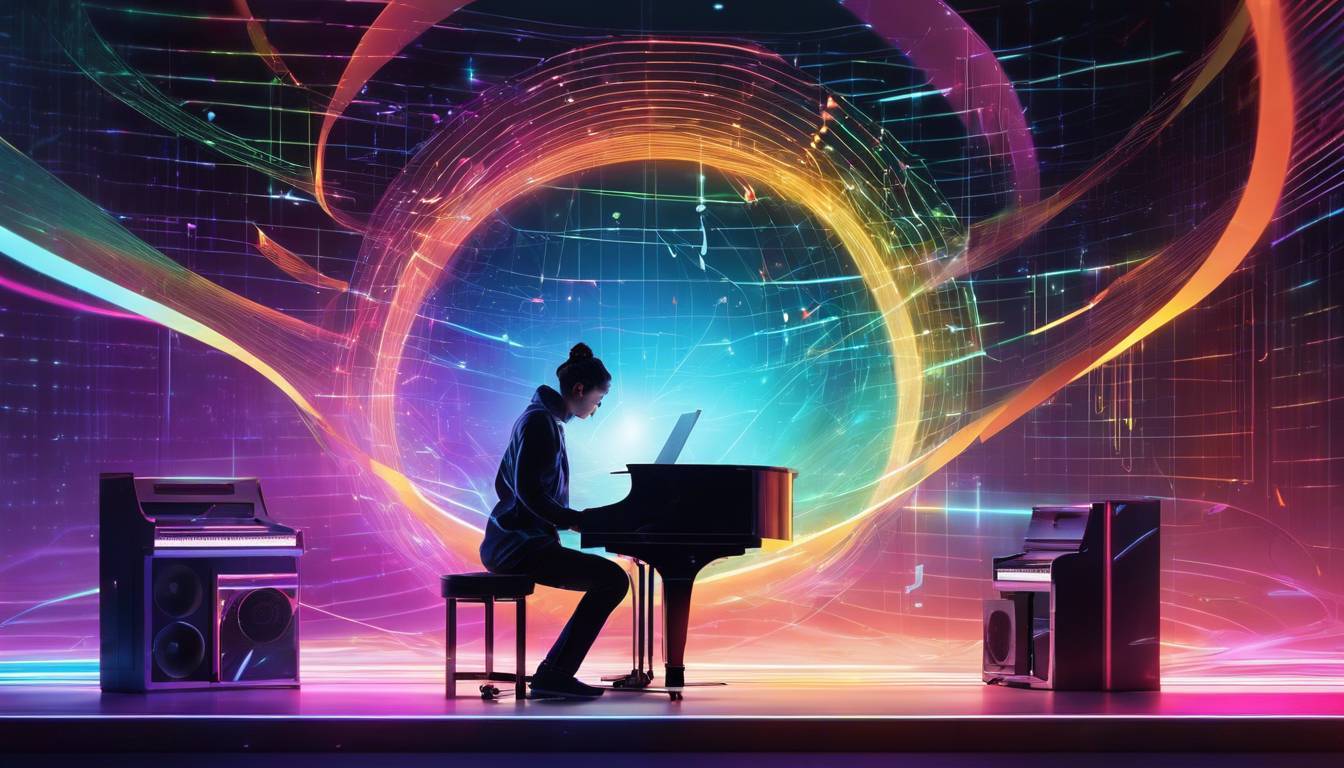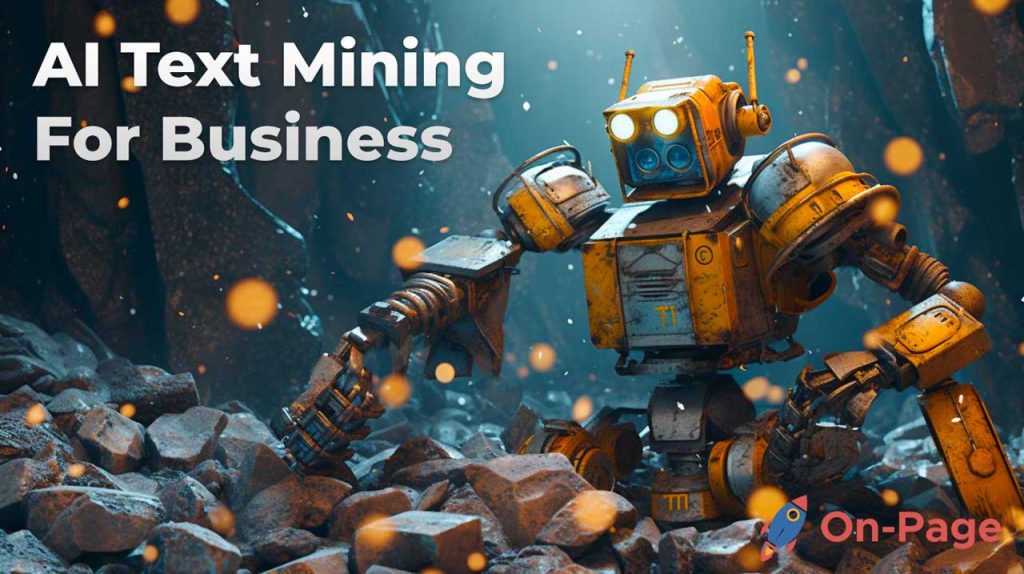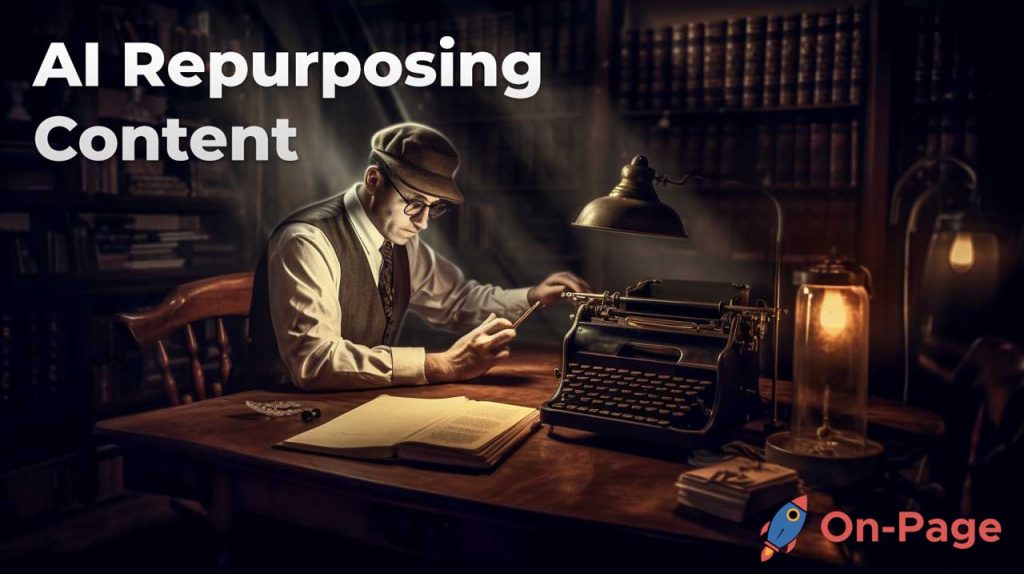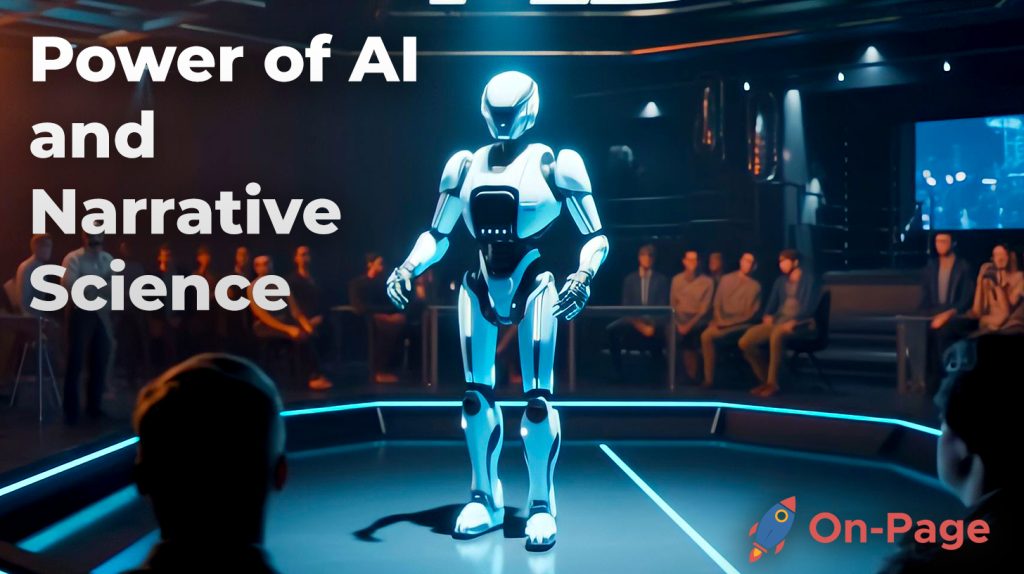AI has infiltrated all aspects of our world, including the often considered sacred realm of art and creativity. It’s changing songwriting by providing innovative methods to generate music, write lyrics, and compose melodies through analyzing large quantities of musical data. This revolution in music composition offers an exciting mixture – blending human creativity with machine intelligence, producing a new breed of songs that stretch the boundaries of what we consider music. This opens up a bold and uncharted future ahead where our favorite tunes might be created not just in studios, but also within complex algorithms of AI platforms like On-Page.ai. But before we dive into these fascinating details, let’s understand exactly what AI songwriting is all about.
An AI songwriter is a tool or software that uses artificial intelligence to generate song lyrics or music compositions. It can help with overcoming writer’s block, finding inspiration, and creating original content for musical projects.
Unpacking AI Songwriting
With the advent of artificial intelligence (AI), music composition is undergoing a revolutionary transformation. AI songwriting involves harnessing the power of AI algorithms to analyze extensive musical data and create original compositions, from both melodies to lyrics. This advanced technology opens up new frontiers for creativity in the music industry, challenging traditional notions of artistry and redefining the possibilities of musical expression.
AI songwriting represents a powerful intersection of art and technology. It enables aspiring artists and established musicians to explore fresh horizons within their craft, leveraging AI-driven platforms like On-Page.ai to propel their creative endeavors into uncharted territory. The sheer potential of AI to generate original musical content has sparked a renaissance in the music composition landscape, fostering an environment ripe with innovation and experimentation.
The incorporation of AI in music composition is not intended to replace human creativity but rather to augment and enhance it. By analyzing vast repositories of musical data, including popular trends, historical compositions, and genre-specific elements, AI algorithms can offer valuable insights and recommendations that can inspire human composers to push the boundaries of their creative output.
Additionally, AI songwriting tools such as those provided by On-Page.ai are designed to streamline the composition process, potentially reducing the time and effort required for initial ideation. This can empower musicians to focus more on refining their artistic vision and exploring unconventional avenues within their compositions. Through collaborative engagement with AI-generated content, artists have access to a wellspring of inspiration that has the potential to transcend conventional artistic constraints.
Platforms like On-Page.ai are at the forefront of AI-driven content generation, including music composition and lyric writing.
The dynamic nature of AI-driven music composition also fosters a symbiotic relationship between technology and tradition. By incorporating AI-generated melodies and lyrics into their creative processes, musicians can infuse a contemporary appeal into their work while preserving the essence of human emotion and expression that defines timeless musical compositions. This harmonious blend exemplifies the evolutionary trajectory of music composition, showcasing how tradition and innovation coalesce to shape the future of artistic expression.
As we unravel the intricate process of AI-driven song composition, we are about to embark on an insightful journey through the procedural steps that shape the creation of music in this technologically advanced era.
Procedural Steps of AI Song Composition
The creation of music is a beautiful and nuanced process that involves intricate and creative decision-making. So, how does AI achieve this complexity in song composition? Let’s break it down step by step.
Data Collection and Analysis
The journey of AI song composition starts with the collection and analysis of vast musical databases. These databases encompass a wide range of musical elements, from different genres and chord progressions to melodies and lyrics. It’s akin to AI studying a comprehensive library of musical knowledge. The AI algorithms utilize this foundational knowledge to create original pieces while incorporating elements from various genres and styles.
The scale of music data analyzed by AI is massive. Imagine a library filled with books on every musical style, genre, rhythm, harmony, and melody. This is the basis of the data analyzed and internalized by AI systems, allowing them to understand and replicate the nuances of diverse musical forms.
Pattern Recognition and Generation
Utilizing advanced machine learning techniques, AI systems engage in pattern recognition within the music database. The AI looks for commonalities, structures, styles, and harmonies present across different musical compositions. Once these patterns are recognized, the AI generates entirely new compositions based on the learned structures while incorporating innovative elements that transcend traditional boundaries and norms.
In a way, this process mirrors how an apprentice musician learns from studying different musical scores and styles. The AI system gradually builds an understanding of what makes certain songs appealing or emotionally impactful to listeners, using this knowledge to create original compositions that resonate with audiences.
Refinement and Iteration
The generated music undergoes a refinement process through iterative cycles. During these cycles, adjustments are made to elements such as rhythm, harmony, melody, and other musical characteristics. This continuous refinement emphasizes achieving specific musical goals and perfecting the emotional resonance within the compositions until the desired quality is achieved.
This iterative process mirrors the dedication and experimentation found in traditional songwriting methods. Songwriters often refine their work through multiple iterations to capture the perfect blend of emotion, storytelling, and musicality. Similarly, AI systems continuously iterate to achieve compositions that captivate audiences through their emotive qualities.
By following these intricate procedural steps, AI systems create original compositions that stand at the intersection of technological innovation and artistic expression.
Positive Impacts of AI on Songwriting
The integration of Artificial Intelligence (AI) in songwriting has brought about a plethora of positive impacts, revolutionizing the creative landscape for musicians and composers. Let’s explore the significant ways in which AI is transforming the art of songwriting.
Enhanced Creativity
Artificial intelligence has opened a gateway to an expansive array of musical styles and compositions, empowering musicians with innovative ideas and fresh perspectives. By assimilating diverse genres, rhythms, and melodic structures, AI facilitates the exploration of uncharted musical territories, provoking a surge in creativity and novel songwriting techniques.
Through AI-generated musical drafts and compositions, songwriters gain exposure to unconventional harmonies and lyrical themes that may not have been contemplated otherwise. This exposure fosters an environment ripe for experimentation, allowing artists to push the boundaries of traditional music and uncover unique expressions that resonate deeply with their audience.
Streamlined Production
Moreover, AI serves as an invaluable ally in expediting the songwriting process. By aiding in initial concept development and providing a wealth of inspiration, AI streamlines various stages of music production. The efficiency brought about by AI technology enables composers to conceptualize and materialize their ideas more rapidly, thereby enhancing productivity without compromising on quality.
In practical terms, this translates to tasks such as generating instrumental backing tracks, suggesting chord progressions, or even seamlessly arranging musical segments. By automating these foundational elements, songwriters can allocate more time and energy towards honing their craft and refining their artistic vision.
Personalized Assistance
Furthermore, AI tools are tailored to offer personalized assistance in music composition – tailoring suggestions based on specific genres, moods, or lyrical themes that align with the songwriter’s vision. Customized recommendations provided by AI not only streamline the creative process but also foster a deeper connection between the artist’s creative intent and the final musical output.
This personalized approach enables songwriters to harness the full potential of their musical vision, leveraging AI as a reliable collaborator that complements their individual style. With AI’s capacity to adapt to diverse preferences and artistic inclinations, it acts as a guiding force in navigating the complexities of musical expression, ultimately enriching the creative journey for composers across all genres.
In summary, the positive impacts of AI on songwriting are multifold; from igniting creativity and reshaping musical conventions to facilitating an efficient and personalized approach to music composition. As AI continues to evolve alongside artistic endeavors, it stands poised as a transformative force in shaping the future landscape of music composition—a testament to how innovation intersects with tradition in profound ways.
As we ponder the transformative influence of AI on songwriting, we’re drawn into examining its pivotal role in redefining the creative process itself.
AI’s Role in the Creative Process
In considering the creative process, it’s essential to understand that AI doesn’t replace human input in music composition; rather, it works alongside human songwriters, assisting and enhancing their creativity. Let’s take a closer look at how AI supports the creative process in songwriting.
Idea Generation
AI has the capacity to analyze vast amounts of musical data and generate initial ideas for chord progressions, melodies, and lyrical themes. By studying existing songs and identifying patterns, AI can provide inspiration for new compositions. This ability to propose fresh musical concepts can be especially helpful when songwriters experience writer’s block or seek new directions for their music. It fosters collaborative creativity between AI resources and human composers, expanding the range of possibilities available to artists.
Music Arrangement
Additionally, AI contributes to the music arrangement process by analyzing and processing musical elements such as instrumentation, tempo, and soundscapes. By offering variations in these elements, AI enables artists to explore diverse musical directions without losing the essence of their creative vision. This can open up new avenues for experimentation and creativity that might not have been readily apparent otherwise.
For instance, if a songwriter is uncertain about the best instrumentation for a particular song or seeks to experiment with different arrangements, AI can assist by providing a range of options. This flexibility expands the creative palette available to musicians, allowing them to explore various sonic landscapes before finalizing their musical arrangement.
Overall, AI’s role in the creative process is not about replacing human creativity but enriching it. The collaboration between AI and human songwriters opens up new possibilities for artistic expression and fuels innovation within the music composition landscape.
As we embrace the evolving landscape of music creation, it’s imperative to observe how AI is being tangibly integrated into real-world scenarios. Let’s explore this integration in the context of actual music production and adoption.
Real-World Adoption of AI in Music Creation
AI’s role in music isn’t just theory; it’s actively shaping the way music is created and produced. In recent years, several prominent figures in the music industry have openly acknowledged and utilized AI in their creative processes to enhance their work. This growing trend highlights the acceptance and incorporation of machine-generated compositions within traditional music creation workflows.
Artists are finding innovative ways to combine AI-generated elements with their own creative instincts, resulting in a hybrid approach that pushes boundaries while respecting traditional artistic practices. This integration not only represents a shift in how music is composed and produced but also challenges the notion of creativity itself.
Musicians such as Taryn Southern have incorporated AI-generated melodies and harmonies into their songs, demonstrating the seamless fusion of human expression with machine-generated content. This collaboration emphasizes the potential for AI to inspire new forms of musical expression and expand the creative palette available to artists across different genres.
Furthermore, this intersection of AI and music has transcended mere experimentation, finding its place in mainstream pop, electronic, and experimental music genres. The versatility of AI-generated compositions has proven to be adaptable across diverse musical styles, contributing to the evolution of contemporary music production.
The utilization of AI in music creation extends beyond novelty to serve as a valuable tool for sparking inspiration, exploring unconventional musical structures, and introducing fresh perspectives into established genres. As a result, artists are not only embracing technological advancements but also leveraging them to sculpt unique sonic experiences that resonate with audiences worldwide.
Leading music producers have integrated AI-generated rhythms and beats into their productions, enriching the sonic landscape with intricate patterns and textures that complement traditional instrumentation. This collaborative approach exemplifies the fluid exchange between human creativity and AI capabilities, illustrating the potential for enriched musical outputs through symbiotic interactions.
In essence, the real-world adoption of AI in music creation signifies a dynamic shift in how creativity is nurtured and harnessed within the music industry. By embracing AI as a creative collaborator, artists are redefining the boundaries of traditional composition, fostering an environment where innovation thrives alongside time-honored craftsmanship.
As we witness the transformative impact of AI on music creation taking hold, it’s crucial to look ahead at the projected trends shaping the future landscape of AI-driven song composition.
Projected Trends in AI-Driven Song Composition
The expansion of AI in generating music is set to revolutionize the way musicians approach songwriting. This evolution will encompass a wide array of musical genres and styles, adding a new layer of diversity to the musical landscape by creating previously unexplored sounds and melodies. By leveraging AI capabilities to generate music, artists and creators can tap into a vast reservoir of fresh, innovative compositions that may have otherwise remained undiscovered.
The incorporation of AI songwriting tools into mainstream music production workflows is poised to become increasingly prevalent. This integration is expected to catalyze significant innovation and experimentation in the music industry. With more accessible AI tools, musicians will be empowered to explore unconventional creative pathways, leading to the emergence of fresh sounds and styles that push the boundaries of traditional musical expression. As a result, we can anticipate a dynamic shift in the ways in which music is conceptualized, composed, and produced.
The collaborative fusion between human songwriters and AI systems represents a groundbreaking development in the realm of music composition and production. By harnessing the capabilities of AI to collaborate with human creatives, new forms of musical expression will come to fruition. This partnership has the potential to elevate artistic ingenuity by offering novel approaches to composition, enabling fresh perspectives and creative possibilities that transcend traditional limitations. The synergistic blend of human emotion and intuition with computational prowess presents an exciting prospect for the evolution of music creation.
In conclusion, the projected trends in AI-driven song composition signify a transformative era for musicians and music enthusiasts alike. The expansive integration of AI-generated music across diverse genres, coupled with the heightened prevalence of AI tools in mainstream production workflows, promises a renaissance in musical innovation. Moreover, the collaborative fusion between human songwriters and AI systems holds immense potential for reshaping the creative landscape, paving the way for unparalleled musical exploration and accomplishment.
Discover how AI is transforming music creation at On-Page.ai. Check out On-Page.ai for the latest advancements in AI-driven song composition.





